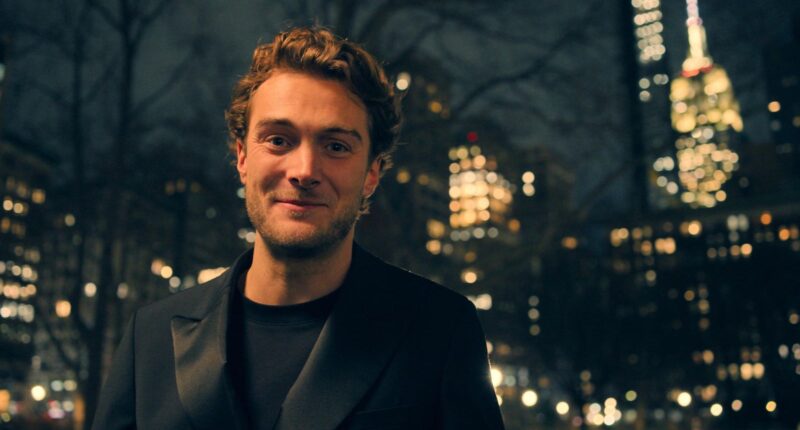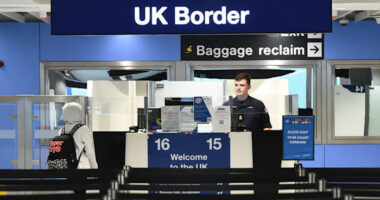Share this @internewscast.com
Jesse Burgess hosts Knife Edge: Chasing Michelin Stars on Apple TV+
Apple TV
“Knife Edge: Chasing MICHELIN Stars” began with a simple but ambitious vision from Gordon Ramsay: to reveal, for the very first time, what it truly takes to earn a MICHELIN Star. That vision sparked a year-long global production, capturing the drama and passion of some of the world’s most elite and emotionally charged kitchens. Filmed over twelve months across different continents, this eight-part documentary immerses viewers in the adrenaline and artistry of top-tier restaurants as diverse chefs chase the culinary world’s most coveted award. What sets Knife Edge Chasing MICHELIN Stars apart is its unflinching, real-time storytelling. Each episode plunges the audience into the heart of kitchen life, from last-minute menu changes and dropped dishes to moments of doubt, resilience, and unexpected triumph. Under Ramsay’s executive production the series weaves together the tension, vulnerability, and creative drive that define fine dining at its highest level.
At the helm is Jesse Burgess, co-founder of the acclaimed global food platform TOPJAW. As the host, he is the perfect bridge between viewers and this rarefied world. Jesse’s approachable style and genuine curiosity add warmth, levity, and relatability, helping to demystify a world often regarded as exclusive and unreachable. The series travels from kitchens in the U.S. and U.K. to fine dining rooms in Italy, Mexico, and the Nordics, following chefs at every stage—some vying for their first MICHELIN Star, others fighting to maintain or reach the elusive three. Crucially, the MICHELIN Guide itself granted unprecedented access for the first time. Through rare interviews with anonymous inspectors and unfiltered entry into award ceremonies, the series sheds light on a famously secretive process. Yet, at its core, Knife Edge remains focused on the individuals—the chefs whose ambitions, setbacks, and perseverance are revealed with striking honesty. The stakes are not just professional but deeply personal, as the outcome of each MICHELIN ceremony can alter the course of a chef’s life.
The Michelin Guide’s 2024 Ceremony featured in “Knife Edge: Chasing Michelin Stars,” now streaming on Apple TV+.
Apple TV
As Knife Edge: Chasing MICHELIN Stars premieres on Apple TV+, Jesse is hopeful that viewers will come away with a deeper admiration for those who dedicate their lives to this demanding industry. The restaurants are rare, the awards are few, but the stories are universal. If you consider yourself a culinary connoisseur, a lover of underdog sagas, or simply someone drawn to tales of human ambition, this series offers an unforgettable exploration of what it means to strive for greatness.
A Conversation with Jesse Burgess
Jesse Burgess is best known as the co-founder and presenter of TOPJAW, the cult food and travel platform redefining modern culinary tourism.
Adam Fussell
Noel Burgess: What inspired you to take on the role of host for Knife Edge Chasing MICHELIN Stars?
Jesse Burgess: When my manager, Lucy Loveridge, first called me about this show I thought “OMG, I don’t think I have a hope in hell of getting that gig, but I think I’m made for it.” After spending so many years interviewing chefs and obsessing over the hospitality industry, I really did think I could be the man for the job – if I ever got the chance!
Noel Burgess: How does Knife Edge provide a fresh perspective on the world of fine dining?
Jesse Burgess: In this series, we really set out to debunk a lot of the myths around MICHELIN dining. Personally I think one of the biggest misconceptions is that if you’re paying, say, $200 a head, the chef/owner must be making a fortune. But that’s just not the reality. Many of these chefs could earn far more money running something more commercial (a fast food place or a chain of sandwich shops for example) and they know that. But they choose fine dining because it’s about relentless passion, artistry, and earning the respect of their peers. For them, the pursuit of a MICHELIN Star isn’t about wealth; it’s about creative fulfilment and recognition for their craft.
Nōksu Chef Dae Kim in “Knife Edge: Chasing Michelin Stars,” now streaming on Apple TV+.
Apple TV
Noel Burgess: What was it like having exclusive access to the MICHELIN Guide’s year-long season?
Jesse Burgess: Crazy. One of the main parts of this job that I absolutely loved was attending loads of these MICHELIN ceremonies. Even the one in Italy, where it’s all presented in Italian, I had no idea what was being said. There’s no subtitles in real life… for now. But it was still so exhilarating. And myself and the viewers have horses in the race, right? Every ceremony we went to, we’d been following these restaurants for months. And so you feel really emotionally invested in every region.
Noel Burgess: Can you share any behind-the-scenes moments that stood out while filming the series?
Jesse Burgess: During the screenings, a couple of people have asked me, “was that moment scripted or constructed?” And nothing in this show is constructed. It’s not a constructed reality TV show. The crew were filming with these restaurants and in these kitchens for a long time, so it was a rule of averages. After being in these kitchens, as the pressure increases, you will get these moments. In episode one, Dae Kim, the chef at Noksu, really loses it, and everything gets a bit much for him. We see him storming out and giving himself a spicy talking to, and that is totally genuine.
I think it’s remarkable that we got those moments; we’re showing real life grit and determination in its raw form, following talented chefs, striving to achieve these MICHELIN Stars. It is the real life version of The Bear.
Noel Burgess: How does the show balance the pressure and artistry of chefs chasing MICHELIN Stars?
Jesse Burgess: I think James Callum, our Series Director, and the whole team at Studio Ramsay Global have done an incredible job creating something that feels both beautifully cinematic and raw at the same time. Visually, Knife Edge sits in that same space as Chef’s Table, it’s shot gorgeously, but it also captures the chaos and energy of real kitchens, with cameras flying around and following the action in that true run-and-gun documentary style.
It strikes a perfect balance between artistry and authenticity, polished cinematography paired with the grit and pace of life in a commercial kitchen. It’s all tied together brilliantly through the score and sound design, which give the series so much atmosphere and emotion.
Noel Burgess: What do you hope viewers will take away from watching Knife Edge?
Jesse Burgess: Operating restaurants at this level is an extremely challenging way to make a living and I hope that Knife Edge creates heightened respect and admiration for the excellent people working extremely hard in this industry.
Noel Burgess: How did Gordon Ramsay’s involvement as executive producer shape the series?
Jesse Burgess: Gordon Ramsay was the executive producer of this series, the whole concept was his idea. There is a graveyard of production companies who all tried to create this type of series with MICHELIN, and no one was successful. Gordon Ramsay has been working on this for years, and it was only due to his reputation and the mutual respect between himself and MICHELIN that he and Studio Ramsay managed to get this over the line.
When filming in all these restaurants, we had no idea who was going to win MICHELIN stars. And we quite often turned to Gordon to give us a bit of a steer on who he thought would or wouldn’t achieve their goals as MICHELIN would, understandably, give us no guidance.
A salsa verde jelly served at Cariño in Chicago in “Knife Edge: Chasing Michelin Stars,” now streaming on Apple TV+.
Apple TV
Noel Burgess: What was the most surprising thing you learned about the MICHELIN Star process?
Jesse Burgess: Loads! One being that no MICHELIN inspector can make a decision on their own. A restaurant has to be inspected by multiple inspectors, and then those inspectors come together before the ceremony and decide unanimously who is going to win these awards. So it’s not a case of one MICHELIN inspector can come in, give you the seal of approval, and you’re off. Also, receiving an invite to these MICHELIN ceremonies is a great pat on the back, but it by no means means that you will be walking away with a Star, multiple Stars, or any type of award. It can just indicate that MICHELIN have their eye on you.
Noel Burgess: How does the show explore the personal stories of the chefs featured?
Jesse Burgess: We have total 360 access to the lives of the chefs featured in the show. You often see us in their homes with their partners, with their families, maybe doing their work outside of the kitchen. And I think it gives a really lovely human insight into who these people are. You can liken these chefs to top athletes who play for the most elite teams, or musicians who go on stadium tours. These chefs are the crème de la crème, so it’s very interesting to see their family dynamics behind the scenes discovering what these stars and these accolades mean to them on a personal level.
Noel Burgess: Were there any particular restaurants or chefs that left a lasting impression on you?
Jesse Burgess: If I could go back to one restaurant this evening, it would be Cariño in Chicago. Chef Norm is from Detroit, but he has spent a long time in Mexico, he’s married someone there and he’s had children there. He now works in Chicago and he’s desperate to bring his family over, but needs the financial stability that a MICHELIN Star could provide to his restaurant in uptown Chicago. I loved his food. Texturally, I just thought it was so remarkably different from other meals I had. I think he’s very quickly going to rise through the ranks and I feel like he’s already, in my mind, at a two MICHELIN Star level.
Noel Burgess: How did your background with TOPJAW prepare you for hosting this docuseries?
Jessie Burgess: I’ve been doing TOPJAW for 10 years, filmed in over 2,000 restaurants and interviewed chefs all over the world from all levels, all walks of life and all credentials. It sounds a bit cliche when actors say ‘it was the role I was born to play’, but being the host of Knife Edge is my dream job. I haven’t been everywhere in the world, but it’s been a busy 10 years and that has given me the grounding to go into these restaurants, describe them and have some awareness of where they sit on a world-class level. But equally, I’m not a chef, never have been, never will be, and so I think I talk about these places in a way that most people would understand. I’m not too chef-y with my lingo. I love telling my friends about restaurants I’ve really enjoyed and the stories behind them – my presenting style is essentially the same.
Knystaforsen owner and Head Chef Nicolai Tram cooking over fire in “Knife Edge: Chasing Michelin Stars,” now streaming on Apple TV+.
Apple TV
Noel Burgess: What was it like transitioning from food and travel content to a high-stakes docuseries?
Jess Burgess: At first, it was honestly quite daunting. When I went for my screen test in Sweden back in August 2024, it was a real eye-opener… and quite scary! I walked into a room filled with cameras, lights, and a full production crew. Coming from TOPJAW, where it’s usually just me, my filmmaker partner Will Warr, and maybe an assistant, I was used to a setup that’s small, fluid, and completely off the cuff.
So stepping into a large-scale production like Studio Ramsay’s Knife Edge was a big shift but I quickly found my rhythm, and the crew were incredible – from our Series Director, James Callum, to Alex Knowles, our Director of Photography, and the whole Studio Ramsay team. We all got on so well that the big crew soon felt small and intimate despite being professionally complex.
Even though there were scripted moments, like my links to camera introducing each region – which sometimes needed a few takes because, well, that’s TV- the overall result still feels really natural and authentic. And that’s a credit to the whole team.
Noel Burgess: What challenges did you face while filming Knife Edge?
Jesse Burgess: The Studio Ramsay crew had to film in a huge number of restaurants, because we genuinely had no idea which storylines would unfold – who might win a Star, or even multiple Stars. In each region, maybe two or three restaurants made it into the final episodes, but in reality, the team were filming in around ten per region. It was a real beast of a production.
From my side, there weren’t any major challenges, aside from making sure the chefs felt comfortable with me and my style. It was important that I earned their trust and told their stories in the most authentic way possible.
Noel Burgess: How did you connect with the chefs and their stories on a personal level?
Jesse Burgess: Getting access to them outside of the kitchen and restaurant environment was very important. Even if it’s just a chat with a friend in a cafe, it allows us to see what they’re like off-duty. Everybody is a very different person in their work and then in their personal life. But in Knife Edge, we see both sides of the chefs. Which means that when it comes to these MICHELIN ceremonies, you as a viewer are so invested. You are emotionally involved with these people and you’re really willing them to win. But the personal insights into these chefs was imperative to capture for Knife Edge.
Noel Burgess: What do you think makes the MICHELIN Star such a coveted accolade in the culinary world?
Jesse Burgess: What I find so remarkable is that the MICHELIN organisation has never been compromised. For more than 125 years, they’ve maintained an extraordinary level of secrecy. One of the inspectors we feature in the series actually describes it as “like working for the CIA.” Their partners might know, but their friends and wider social circles have no idea they’re inspectors.
In 2025, when freedom of information and social media is everything and everywhere, the fact that no inspector has ever gone rogue is incredible. Even while making the show, MICHELIN remained extremely guarded; during our interviews, even the producers weren’t allowed to see who the inspectors were. The people you see on screen are actors, though the voices are real – just digitally altered.
That level of integrity is why the MICHELIN Star still holds so much weight. It can’t be bought, it can’t be influenced, it’s entirely earned.
Chicken Nuggets with caviar served at Coqodaq in New York City as featured in “Knife Edge: Chasing Michelin Stars,” now streaming on Apple TV+.
Apple TV
Noel Burgess: How do you see the fine dining industry evolving in the next few years?
Jesse Burgess: As you’ll see in Knife Edge, the average MICHELIN-style restaurant isn’t always what people might imagine. The stereotype of white tablecloths and hushed dining rooms is giving way to something much broader. The MICHELIN Guide itself is expanding into new regions, they’ve just launched in the Philippines – and I’d love to see them explore Africa next, because there’s some incredible culinary innovation happening there.
As MICHELIN’s footprint grows, these restaurants are becoming more diverse and more accessible. Fine dining doesn’t always mean ultra high-end, and a MICHELIN Star doesn’t necessarily mean a traditional fine dining experience. The landscape is evolving and Knife Edge really captures that shift.
Noel Burgess: What role do you think storytelling plays in the success of a restaurant or chef?
Jesse Burgess: MICHELIN judges restaurants on five key criteria: consistency, quality of produce, harmony of flavours, mastery of cooking techniques, and the personality of the chef on the plate. I’m told that it’s that final element – the chef’s personality – that often separates a one-Star restaurant from a Two or Three-Star establishment.
Every MICHELIN-starred restaurant has to be consistent and use the best ingredients, but what really elevates a chef is when their food has such a distinct signature that another chef or inspector could taste a dish and immediately know who created it. That individuality, that storytelling through food, is what makes a restaurant memorable. When a team brings personality and authenticity to the table, rather than operating as a faceless business, it’s what helps them truly connect with diners and rise through the ranks.
Noel Burgess: How does Knife Edge highlight the cultural diversity of international fine dining?
Jesse Burgess: Knife Edge really reflects the cultural identity of each city we visit – you get a sense of how local traditions, produce, and personality shape fine dining in completely different ways around the world.
At the same time, the series doesn’t shy away from showing that this space has historically been very male-dominated. What’s been great, though, is that we’ve had the chance to spotlight several incredible women-led stories throughout the series. I really hope that by sharing their journeys, the show helps inspire more women to pursue careers in this industry and feel that their voices belong here too.
Noel Burgess: What’s your personal favorite cuisine or dining experience from the series?
Jesse Burgess: I mentioned Cariño in an earlier answer. I do love that place in Uptown, Chicago. But one dining experience which really floored me, and I can almost remember every single aspect of it still today, is Jordnær in Copenhagen. Everything was unbelievably delicious and texturally very interesting. The way Chef Eric manages to phase flavours as you eat, it’s magic, let alone science. You bite into something and he just knows when each element is going to hit certain parts of your mouth, and I feel like I’ve just never had anything like it. It’s not a cheap meal but to create such a lasting impression, it’s worth it.
Noel Burgess: How has TOPJAW’s success influenced your career and opportunities like Knife Edge?
Jesse Burgess: In a recent show screening, I actually thanked Apple TV+ for taking a chance on a lad from social media. Hosting Knife Edge is genuinely the job I’ve always dreamed of, but I thought it might come much later in my career, if it came at all. The fact that it’s happened now just shows that when you put yourself out there, stay passionate, and keep showing up year after year, the right people eventually take notice. I feel incredibly honoured and grateful to have been given this opportunity.
Noel Burgess: What’s been your favorite moment or interview from TOPJAW’s “Best of London” series?
Jesse Burgess: The first episode we ever did with Dom Fernando will always hold a special place in my heart. When we put it out on Instagram and TikTok, it just exploded – the views, the engagement, everything. It was incredibly rewarding to see that kind of response. The format has since been copied all over the world, but I think what’s hard to replicate is genuine knowledge, enthusiasm, and long-standing relationships.
Don Fernando from Paradise will always be a standout, but Marcus Wareing was another pivotal moment, he was the first big name we had on the series, and somehow that episode ended up on the second page of The Times, which was a huge milestone for us.
Celebrity-wise, I’ve loved so many of the interviews; Idris Elba, Ed Sheeran, Florence Pugh – they were all incredible in their own ways. And the chats we’ve had with food writer Grace Dent are always a personal favourite too.
Noel Burgess: How do you balance your cheeky, charismatic style with the serious tone of a docuseries?
Jesse Burgess: The Studio Ramsay team were incredibly generous to me, they must’ve filled a lot of tape because they just kept the cameras rolling while I was in these restaurants. That gave me the freedom to talk as I usually would on TOPJAW – completely off the cuff, in the moment, and genuinely myself. We combined that natural, one-take energy with the scripted elements needed to bookend the episodes and tie the narrative together.
Both Apple TV+ and Studio Ramsay were really clear that they wanted the real me – the same person I am on TOPJAW. They created an environment where I could be my authentic self, and I think the edit team have done a brilliant job weaving that together with the intensity of high-pressure kitchens, the emotional interviews with chefs, mysterious chats with inspectors, and my narration that moves between serious reflection and the more playful moments.
Noel Burgess: What advice would you give to aspiring food hosts or content creators?
Jesse Burgess: I really don’t claim to be an expert in this – I still have so much to learn. But my biggest piece of advice would be to stick at it. TOPJAW has taken over 10 years to become what it is today, and that persistence was everything. Be out in the world, meet people, and connect – don’t just live through your phone. Building an audience online is great, but if you’re not engaging with the real community and industry around you, you’re limiting how far you can go. I believe the real opportunities come from those in-person connections.
Noel Burgess: What’s next for you after Knife Edge? Any exciting projects on the horizon?
Jesse Burgess: We’re really working on our storytelling at TOPJAW, documenting stories of some of the most interesting characters in London. There are a number of hospitality businesses in London that have been around for decades, but as margins get tighter we’re at risk of losing some of these iconic spots which have helped shape London. I think it’s super important that we use our platform to help raise awareness and protect their longevity.
Of course I would love to get stuck into a second series of Knife Edge Chasing MICHELIN Stars. I really hope the series connects with people as I think it’s a show that could develop for many years, telling so many incredible stories of people all over the world who are working their socks well and truly off!









